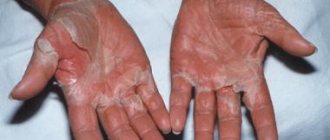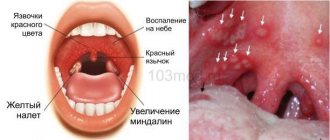Medical indications
Why do the labia swell?
There are several reasons for the occurrence of the symptoms in question. The tumor can be triggered by bartholinitis - inflammation caused by an infection occurring in the Bartholin gland. In this case, purulent foci appear. A cyst formed in the gland can provoke this condition. If bartholinitis is detected early, the prognosis is favorable. Otherwise, an abscess develops. Another reason why the labia are swollen is vulvovaginitis, which is associated with irritation of the organ caused by mechanical contact. With this pathology, the genitals may itch and swelling may occur.
Another common cause of swelling on the labia is candidiasis. With this disease, other signs may appear:
- presence of cheesy vaginal discharge;
- presence of an unpleasant sour odor;
- itching;
- pain.
The following diseases can lead to swelling of the genital organs:
- progressive vulvodynia;
- vulvitis;
- sensitive skin.
Only a qualified doctor can find out the exact cause of swelling of the labia after examining the patient. Then therapy is prescribed, consisting of antibiotics and immunomodulatory drugs.
Pregnancy
If a woman experiences swelling of the labia during pregnancy, it is recommended that she first consult with her gynecologist. Most often, swelling of the labia is observed in the second or third trimester.
This is explained by the fact that this period of pregnancy is characterized by increased blood flow in the uterus, as well as the provision of microelements and nutrients to the entire reproductive system and the developing fetus. Accordingly, swelling of the labia during pregnancy is a normal phenomenon.
If, in addition to the above condition, there is an unpleasant odor or discharge, then you need to inform your obstetrician-gynecologist about this. In some cases, such symptoms are characteristic of infectious diseases.
If swelling of the labia is noticeable at a later stage, then you should not worry either, since this is caused by pressure on the vessels due to the enlargement of the fetus.
Bartholinitis
If your labia are swollen, then first of all you should blame such an unpleasant disease as bartholinitis. At the first stage of the disease, annoying itching and redness of the labia appears. If you do not see a doctor immediately, the condition will continue to worsen. There will be an unpleasant odor and an abscess (swollen abscess), and the lips may also become swollen.
At this stage, bartholinitis is considered to be already advanced, and the disease will not get rid of without the help of a doctor. If you ignore these symptoms, then after sexual intercourse or even during a normal trip to the toilet, severe pain will appear due to irritation of damaged and inflamed tissues.
First of all, it is ignoring personal hygiene. Bacteria and viruses develop on dirty laundry. After which the infection enters the Bartholin gland and provokes purulent and painful reactions. Also, swelling and itching of the labia with bartholinitis can be caused by dirty hands when in contact with the genitals during masturbation or a regular trip to the toilet.
But that's not all. There are many personal hygiene products on the market for intimate areas: low-quality and cheap products most often provoke bartholinitis with their chemical composition.
- Sexual intercourse. In this case, the swelling does not require treatment, but goes away on its own after a few hours. Its appearance is caused by blood flow, which is triggered by sexual intercourse. It is worth contacting a specialist if the swelling does not subside for a long time.
- Candidiasis. This disease is better known as thrush. Swelling is one of its symptoms, along with itching and pain, especially during urination and sexual intercourse, as well as a curd-like discharge from the vagina. Both men and women are susceptible to the disease. Both partners need to be treated, since the causative agent of the infection is transmitted through sexual intercourse. You can become infected by using someone else's underwear or through other objects. The fungus itself does not pose any danger. The infection develops only when conditions are favorable for this: hormonal imbalances, weakened immunity, unbalanced diet, poor-quality underwear made of synthetic materials. As a result, itching is felt on the external genital organs. Constant scratching leads to swelling. You can get rid of it by curing the main cause of its appearance - candidiasis.
- Pregnancy. This period in a woman’s life is characterized by the accumulation of fatty tissue in the genital area and lower abdomen in order to provide warmth to the fetus. Often these formations can be mistaken for edema. The swelling goes away after childbirth, but if it causes discomfort, you should see an obstetrician-gynecologist.
- Vulvodynia. This disease is accompanied by throbbing pain. They appear suddenly, bother you for a long time, and then also disappear unexpectedly. Vulvodynia in some cases leads to swelling. Its cause can be sexually transmitted infections, uncomfortable underwear, somatic diseases and even damage to nerve endings. Pain occurs during sexual intercourse and movement. You should contact a specialist for help, otherwise the discomfort may become so severe that it will not even allow you to sit quietly.
- Herpes. It is transmitted through sexual intercourse, and the risk of its occurrence increases several times with frequent changes of partners or weakened immunity. The main symptoms of herpes: the formation of ulcers and blisters, inside of which fluid accumulates, general malaise and fever, itching, swelling and redness of the skin. There may be pain when urinating. Symptoms of herpes are noticeable only during the period of its exacerbation for several weeks. Then the disease may not manifest itself in any way.
- Vulvitis. Vulva refers to the external genitalia: labia, clitoris, vagina, hymen. Inflammation of this area is vulvitis. It can be caused by taking a number of medications, including antibiotics, certain diseases, allergies, failure to comply with basic hygiene rules, as well as increased humidity in the genitals. Swelling is the main symptom of vulvitis, as are redness of the skin, burning and general weakness.
- Bartholinitis. This disease is an inflammation of special glands located in the vestibule of the vagina. They are called Bartholin's. Inflammation is caused by special microorganisms, and sexually transmitted infections accelerate its development. At the initial stage of the disease, an abscess forms in the area of the Bartholin glands. The skin on the genitals becomes an unnatural red color and swelling appears.
- Chronic diseases;
- Allergy;
- Other diseases such as gonorrhea, chlamydia, ureoplasmosis.
Causes of swelling
Despite the increased sensitivity and vulnerability, the vestibule of the vagina performs a protective function. It prevents pathogenic microorganisms from entering the body. Lips are divided into small and large. If the labia majora are swollen, then we may be talking about skin diseases. The labia minora border the entrance to the vagina, so their swelling is associated with gynecological diseases.
Why swelling develops in the area of the folds can be found out after a visit to the gynecologist. It is difficult to independently determine what it is and how to treat it. The cause can be pathological or physiological.
Pathological causes of edema are as follows:
- Allergic reaction - develops to products that come into contact with the vulvar mucosa. These include intimate lubricants, hygiene products, pads, etc.
- Candidiasis - the cause of thrush lies in a decrease in local immunity. The risk of developing the disease increases with excessive consumption of sweet foods.
- Bartholinitis is a disease in which the glands responsible for the production of natural lubrication during sexual intercourse become inflamed, called bartholinitis. The main reason for its development is infection in the vagina. With bartholinitis, cysts form that itch and hurt;
- Venous stagnation - as a result of circulatory disorders, venous blood stagnation develops. It is provoked by tight underwear, irregular sex life and a sedentary lifestyle.
- Vulvovaginitis - with insufficient intimate hygiene and unprotected sexual intercourse, vulvovaginitis develops. With its development, not only the genitals become swollen, but a specific discharge with an unpleasant odor appears. Physiological causes of swelling of the vaginal vestibule include increased sexual desire. In this case, blood rushes to the pelvic organs, which leads to slight swelling of the genital organs. It is temporary in nature.
The speed of recovery depends on how quickly the woman consulted a doctor.
When does swelling appear?
There are factors that can provoke lip enlargement. The answer to the question “why is the labia swollen after sex” is simple. The reason is the woman's sexual arousal. Sometimes the symptom provokes damage to the mucous membrane during intimacy. To rule out this option, it is advisable to examine the outer surface of the vagina for wounds and cracks.
Sometimes changes in the size of the vulva are noted during pregnancy. This is due to the influence of hormones responsible for bearing a child. Not only external, but also internal reproductive organs increase. Treatment in this case is not required.
If the labia are swollen after hygiene procedures, the cause is an allergy to the cleanser. Doctors recommend choosing gels and foams with a neutral pH level. In rare cases, an allergic reaction develops to substances that are impregnated with sanitary pads. To avoid unwanted symptoms, you should use fragrance-free pads.
The risk of gynecological diseases increases during menstruation.
Clinical picture
Gynecologists identify the anatomical causes of swelling of the labia. A similar clinic is observed with sexual fantasy, mechanical stimulation of reproductive function, and sexual intercourse. If the labia is swollen due to the above reasons, therapy is not required.
Swelling of the organ in an adult woman may appear after sex (with prolonged contact with the penis). In such cases, it is recommended to use anti-allergenic lubricant. In this case, no special treatment is prescribed. Situations when a doctor's help is required:
- the smell, consistency and color of vaginal discharge have changed;
- if the labia are swollen and itchy, and the delicate skin is damaged;
- when compactions and neoplasms appear.
The symptoms described above can be caused by infection, lack of intimate hygiene, parasitic infection, or wearing uncomfortable clothing. With vulvovaginitis, inflammation occurs on the labia. In this case, one or two lips may be affected. The causes of the disease include irritation or allergies. Vulvovaginitis often develops against the background of active masturbation. Pathology can be caused by infection. It is characterized by the following symptoms:
- pain when urinating;
- skin hyperemia;
- abnormal vaginal discharge;
- I want to scratch my genitals.
With vulvodonia, inflammation spreads to the nerve endings located in the vulva. To eliminate swelling of the labia, long-term drug treatment based on antibiotics will be required. The symptoms in question can be observed with thrush, the causative agent of which is candida and various fungi. In this case, additional symptoms may appear:
- pain during sex;
- red and irritated skin;
- the appearance of curdled masses;
- severe swelling.
Gardnerellosis is another reason why the labia is swollen. In this case, it is recommended to undergo a comprehensive laboratory examination.
Diagnosis of swollen labia
A tumor of the labia can be detected with a complete gynecological examination. The specialist examines the external genitalia and assesses the condition of the vagina and cervix using a special mirror.
During the examination, smears are taken from the vagina and urethra, scrapings from the surface of the tumor, and, if necessary, a puncture is taken for histological examination. Also during the diagnosis, a transvaginal ultrasound, a general blood test and PCR studies are performed to identify hidden infections.
Discomfort during pregnancy
During pregnancy, significant changes in the female body are observed. Therefore, swelling of the labia during pregnancy is a normal phenomenon that can be detected by the woman herself. A similar clinic is clearly expressed in the 2-3 trimester of pregnancy. During this period, blood flow to the uterus and labia increases. Therefore they may swell. But if only one lip is swollen, a consultation with a gynecologist is required.
Normal blood flow indicates a woman is ready to give birth. But at the slightest deviation from the norm (the appearance of an unpleasant odor from the vagina or discharge of a different nature), it is recommended to consult with your doctor.
Against the background of decreased circulatory activity, varicose veins of the labia develop. If the balloon bursts, bleeding will occur. In this case, an itchy condition may occur, which irritates the pregnant woman. If a woman in position has a swollen labia majora, a cesarean section is rarely prescribed. Before giving birth, it is recommended to wear comfortable natural underwear. The expectant mother should get proper rest.
It is more difficult if the genital itches due to infection. In this case, the pregnant woman may complain of a blistering rash, erosion, high fever, and unpleasant discharge. With such symptoms, it is recommended to take a smear for flora and undergo treatment.
The upper lip is swollen - what could it be and how to treat it in a child and an adult?
If the upper lip is swollen or the lower lip is swollen, it looks unsightly, causes discomfort, and sometimes pain.
To relieve swelling, you need to find out why it appeared. A doctor will help with this and will also select effective treatment. Before visiting a doctor, you can turn to folk recipes and emergency methods for relieving swelling of the upper or lower lip. Lip swelling never occurs without a reason. Any swelling that appears on the human body indicates some kind of problem in the body.
If you independently identify the factor that provoked the swelling, only a doctor can make a diagnosis. You can see what swelling caused by various reasons looks like in the photo accompanying the article.
Swollen lips are caused by the following reasons:
- inflammation;
- allergies (often causes swelling of the upper lip);
- infectious disease (for example, herpes);
- anesthesia during dental procedures;
- Plastic surgery;
- piercing;
- tattoo;
- traumatic injury (for example, a person’s lip was broken);
- acute malnutrition;
- preeclampsia;
- heart, kidney or liver failure;
- skin cancer, lip cancer;
- fluid retention in the body, which causes the lips to become swollen;
- angioedema;
- cheilitis;
- consequences of blood transfusion.
In some cases, there is suppuration and an unpleasant odor from the oral cavity. Body temperature may rise.
Swelling of the lips is one of the manifestations of an allergic reaction. Then there will be other signs of exposure to the allergen on the body - rash, itching, redness. If the upper lip is swollen, but the opposite lip does not pout, this is a common occurrence with allergies. Allergens can enter the body through insect bites or through the use of the following substances:
- Food;
- medicines;
- mouth rinses;
- toothpaste;
- decorative cosmetics;
- skin care products.
Herpes
Swelling is sometimes caused by the herpes virus. It may already be present in the body or penetrate through a kiss. If this disease develops, the patient first feels itching and tingling. He then discovers that the itchy area is swollen. When the upper lip is already swollen, small blisters appear on it. All these symptoms develop within 5 to 12 hours.
If the lips are swollen, or other unpleasant symptoms appear, this may be a consequence of a person’s desire to improve his appearance. Changing the shape of the lips through plastic surgery, tattooing or piercing - all these procedures can cause swelling. Sometimes the specified area may swell only after a certain period of time after the manipulation.
If any unpleasant or painful sensations occur after a puncture or tattoo, first of all you need to carefully examine the area in which the manipulations were performed. It is advisable that the patient be examined by the same specialist who performed the procedure.
This way you can confirm or exclude suppuration or inflammation caused by infection. Piercings also need to be checked from the inside. This way you can identify foreign bodies that have gotten inside.
Sometimes the cause of pain and discomfort is jewelry that fits into an extended puncture.
After plastic surgery to enlarge the lips, their swelling is a normal reaction of the body. The more special substance is injected, the more the lip will swell.
When extracting a tooth or other dental procedures, doctors often resort to anesthesia. The anesthetic is injected into the gums.
As a result of the effects of the anesthetic, the patient feels that part of his face and the area under his nose are numb. If your lip is swollen after the administration of anesthesia, this is not a reason to panic.
Minor facial swelling is a common side effect of this procedure. Usually the swelling disappears after the anesthetic wears off.
If the symptom does not go away within 24 hours, the gums or the area under the nose hurt, and the place where the injection was given becomes inflamed, you should immediately consult a dentist. An infectious process may be developing.
Traumatic damage to the lip immediately causes a corresponding reaction. The injured area turns red and swells. It's not just a blow or a fall that can cause a lip injury. Causes also include exposure to aggressive chemicals, frostbite, chapping, burns, cuts, cuts, and biting.
Swelling of the lip can sometimes be accompanied by fever, chills, and fever. As a rule, such symptoms indicate the development of an infectious disease in the body.
In addition to herpes, fungal bacterial infections can also trigger symptoms such as lip swelling in combination with fever and general malaise.
In such cases, it is necessary to treat the original source of infection, and for diagnosis you will definitely need to see a doctor.
If swelling of the upper lip occurs, the opposite lip or both are swollen, this may be a symptom of a condition that is life-threatening to the patient. An example is anaphylactic shock due to exposure to an allergen.
Sometimes we are talking about one of the stages of a neoplasm.
If you notice the following symptoms in yourself or another person, accompanying swelling of the upper or lower lip, you should immediately call an ambulance:
- severe swelling appeared suddenly;
- the tongue swells (see also: for what reasons does the tongue sometimes swell?);
- pain when pressing on the lip or area under the nose;
- breathing problems;
- itching in the mouth or throat;
- lips or nails have acquired a bluish tint;
- fever;
- sensation of tightness in the throat.
If a child has a swollen lip, it will be more difficult to establish the cause, since it is difficult for the child to describe the sensations or talk about the bruise, or that he accidentally bit his lip.
Frequent causes of swollen lips in a child are improper breastfeeding technique, stomatitis and trauma. In any case, treatment for a child and an adult will be similar.
It is important to consider age restrictions when taking medications.
If swelling of the upper lip appears, there is no need to panic. There are a number of remedies that will help remove the symptom (unless, of course, we are talking about allergies, a reaction to anesthesia or a viral infection), and they are always at hand. Emergency methods for eliminating lip swelling include the following:
- briefly dip a tea bag in boiling water, cool, and make a compress;
- cut an aloe leaf lengthwise and apply the inside to your lips;
- make a cold compress (you can use dry ice) for 10 – 15 minutes.
| Cause | Drug treatment | Note |
| Allergic reaction | Antihistamines:
| If there is swelling that occurs after a bite, or a large progressive swelling, you should immediately consult a doctor. |
| Traumatic injury | Disinfectants:
| After treatment, the wound is sealed with adhesive tape. If the lip is severely deformed, you need to go to a trauma center. |
| Herpes virus | Antiviral medications:
| It is impossible to cure a virus, including one acquired through a kiss. Medicines successfully relieve symptoms and block their reappearance. |
| Lip tattoo | Anti-allergy medications (Suprastin, Zortex). Hydrocortisone ointment or dexamethasone (as prescribed by a specialist). Prednisolone and Furasimide. | All of the medications listed have contraindications and can cause side effects. You should consult your doctor. |
| Plastic surgery | Antihistamines. | Anti-allergy tablets and ointments can only be used as prescribed by a specialist. |
Folk remedies
You can use traditional medicine if your lip is swollen only if you cannot see a doctor. For example, an allergy arose during a trip to nature, a person tore one of the sponges outside the city, or it swollen at night. Traditional recipes will help temporarily alleviate the patient’s condition. The following remedies are effective:
- Mix baking soda with water, apply the resulting paste to your lips and leave for 10 minutes;
- mix Fuller's earth, ground turmeric and water, spread the paste on the lips and leave for 15-20 minutes;
- grind the aloe leaf into a paste, wrap it in gauze and apply to the swelling for a quarter of an hour.
In most cases, lip swelling does not pose a serious threat to the health or life of the patient. Tumors pass without leaving behind even memories. However, if edema occurs, consultation with a specialist should not be neglected, as this can sometimes lead to complications:
- a large ugly scar or blood poisoning after a poor-quality piercing;
- life-threatening infection due to advanced eczema;
- constant appearance of herpes blisters all over the face;
- the development of the next stage of cancer (if the lips are swollen due to a tumor);
- Quincke's edema during an allergic reaction (life-threatening).
To prevent the sponge (for example, the upper one) from becoming swollen, it is recommended to pay attention to preventive measures:
- wash your hands thoroughly with soap upon returning home, wash fruits and vegetables before eating them;
- use high-quality cosmetics from trusted manufacturers;
- piercing and tattooing should be done in official salons by experienced professionals;
- use the balm in dry and windy weather;
- treat dental diseases in the early stages with qualified specialists;
- If you are prone to allergies, avoid contact with allergens and always have an antihistamine with you.
It is also recommended to limit close contacts (kisses) with unfamiliar people. Eat a balanced diet, take vitamin and mineral complexes, avoid stress and get proper rest.
Vulvovaginitis
In second place for diseases that can cause inflammation on the external genitalia is vulvovaginitis. At the first stage, this disease manifests itself in the form of slight irritation upon contact with the labia.
As the disease develops, swelling of the labia minora and majora appears, which is accompanied by itching and the appearance of an unpleasant odor. Compared to bartholinitis, this is not such a serious disease, but still the discomfort with vulvovaginitis is very noticeable. The appearance of pathological discharge from the genital tract is noted.
- First of all, this is dirty laundry, which is not surprising. Infections that multiply and develop on it become the starting point for the disease.
- The fabric from which underwear is made. Often, coarse fibers or lace and braid cause vulvovaginitis, irritating the delicate skin of the external genitalia.
- The composition of the chemical used in washing underwear. Often the contents of such drugs are very “aggressive” and cause pain and swelling.
- Sexually transmitted infections.
- Activation of one's own microflora when immunity decreases.
Associated symptoms
Regardless of the reason for the swollen labia, this symptom will not be the only one in the clinical picture. Associated symptoms may also include:
- The presence of itching and burning of varying degrees of severity;
- A feeling of pain that can appear both at rest and after intimacy, or skin contact with underwear, while sitting or walking;
- Atypical vaginal discharge, which may have an unnatural color and an unpleasant odor;
- In case of a herpetic lesion, the appearance of dry skin and the appearance of bubbles filled with liquid on the lips will be noted;
- In addition to the fact that the labia are swollen, their skin will be very red;
- The woman will feel a weakening of physical activity, general weakness and fatigue will appear;
- There is noticeable discomfort in the area of the external genitalia;
- Seals will form that can be felt during palpation.
If genital itching and swelling appear, as well as one or more of the symptoms described above, the girl should not delay her visit to the gynecologist. It is strictly forbidden to self-medicate, as this can hide symptoms and blur the clinical picture, which will complicate the diagnosis and development of treatment tactics.
Therapy methods
If the labia minora is swollen, and other discomfort is observed in the intimate area, a consultation with a gynecologist or dermatovenerologist is required. Specialists can conduct a comprehensive diagnosis.
If the labia minora are swollen, antiviral, antifungal and antibacterial medications are taken. Effective drugs of the second group include Flucostat. It is prescribed to eliminate fungal infections. The medicine is taken once a day. In this case, a specific duration of administration is observed - 2-4 weeks. The duration of therapy is controlled by the attending physician. It depends on the type of pathogen and the severity of the disease.
Flucostat is contraindicated in patients with high sensitivity to triazole compounds. An analogue of this drug is Fluconazole. It is taken orally in a similar manner. The only difference is a slight decrease in the therapeutic effect. Therefore, Fluconazole is taken in higher dosages.
If your lips are swollen and allergies of various origins are identified, you will need to take an antihistamine:
- Amizole is taken orally. The daily dosage is divided into 3 doses. Not prescribed for hypersensitivity to the components of the drug, for heart attack and pregnancy;
- Loratadine-Verte is administered orally once a day. For PN, the dosage is reduced twice or remains unchanged, but the drug is taken every other day. It is not prescribed to pregnant women or during breastfeeding.
Symptoms of the inflammatory process
This disease is characterized by:
- specific edema;
- hyperemia of the genital organs;
- pain, aching or tugging sensation;
- itching or burning.
In advanced cases, the local temperature rises and, in case of complications, the general body temperature. This condition of women requires treatment in a hospital.
The swelling may extend beyond the anatomical boundaries of the labia. Sometimes ulcers, ulcers, and erosion may appear. Watery discharge appears on the underwear, and if the process is complicated, blood appears. Regional lymph nodes become denser and in some cases are also involved in the pathological process.
Discomfort and pain intensify with physical activity, sexual intercourse, and urination. Inflammation and swelling can spread to the labia majora and minora, as well as the clitoris and cervical (urethra) canal. Continuous itching or burning in the perineum, redness of the skin.
Candidiasis, or thrush
A very unpleasant disease that women of any age face. Its symptoms and routes of infection are almost no different from vulvovaginitis, but thrush still has its own characteristics. With candidiasis, swelling and severe pain are also accompanied by the release of cheesy masses from the vagina, which are accompanied by a very unpleasant sour odor.
In this case, you should definitely consult a doctor. Thrush is not a dangerous disease that can damage the female body, but the disease will bring a lot of trouble.
Vulvitis
Another unpleasant disease that causes the labia to become inflamed, causing severe pain during urination or after sex, is vulvitis. As with most diseases of the female intimate area, vulvitis can be caused by not maintaining personal hygiene at an appropriate level.
In addition to severe pain and itching, which intensifies as vulvitis develops, a yellow-green discharge appears, which is accompanied by an unpleasant odor, and the labia can become very swollen. If you notice these symptoms, you should immediately consult a doctor for help.
Gardnerellosis
Of course, if you take care of yourself, change your underwear regularly, play sports, have toned abs and use only natural products to care for your intimate area, then the likelihood of getting sick is much lower. But still, pain in the external genitalia may appear, and its cause will not be a violation of hygiene. We are talking about gardnerellosis.
The cause of this disease is the bacterium Gardnerella vaginalis. It begins to produce an unpleasant odor that resembles the smell of rotten fish. Vaginal discharge occurs, causing irritation, itching and pain on the outer labia.
You should not even try to cure the disease on your own; you need to seek help from an experienced gynecologist.
Treatment
In most cases, severe swelling, which is also accompanied by an unpleasant odor, is a consequence of the development of a disease such as thrush. The gynecologist prescribes local medications to the patient, usually vaginal suppositories. They should be used until the symptoms disappear completely. At the same time, immunostimulating agents are prescribed. An advanced form of thrush can cause a more serious disease - vulvodynia, characterized by severe pain.
To treat this disease the following is used:
- Hormonal therapy, including female sex hormones.
- Painkillers for internal or local use.
- Antihistamines.
- Sometimes doctors prescribe physical therapy. Some isolated cases can only be treated with acupuncture or surgery.
- Therapy can be supplemented with traditional medicine: healing decoctions and infusions. As home therapy, it is appropriate to use warm baths based on herbs such as chamomile, string and calendula. All of these herbs have anti-inflammatory qualities. Baths help relieve swelling and other symptoms.
- If the edema appears as a result of a failure of the endocrine system, then the main task of the chosen therapy is to stimulate or inhibit this function. Eliminating the cause will relieve all manifestations of swelling and discomfort.
If a woman has discovered swelling of the genital organs, there is no need to hope for a miracle and expect that it will go away on its own. This condition is considered quite dangerous, and the woman herself experiences quite unpleasant sensations. Therefore, you should not aggravate your condition, but you should immediately seek help from a specialist. Embarrassment in this situation is completely inappropriate. The gynecologist will prescribe effective treatment that will quickly relieve unpleasant symptoms. We have only one health, and we must take care of it!
Treatment with other medications
For swollen labia, an antiseptic is prescribed. Most often, topical ointments or tinctures are used. If a woman has been prescribed Betadine, then it is recommended to apply it in a small layer to the sore spot. The manipulation is carried out 2-3 times throughout the day. Experts allow you to put a bandage on the ointment or use a sanitary pad so as not to stain your underwear.
Betadine is contraindicated in women who have demonstrated hypersensitivity to the components of the ointment. Other contraindications include problems with the thyroid gland. Pregnant and lactating women should use with caution.
If the symptoms in question are eliminated with antibiotics, dysbiosis may occur. To maintain the balance of beneficial intestinal bacteria, Linex and Bifidumbacterin are used. The duration of treatment is adjusted by the doctor.
If the patient is pregnant, suppositories are prescribed, which are administered twice during the day. But such therapy is effective for mild swelling of the labia. Not used if the female body is highly sensitive.
To eliminate the symptoms in question, it is recommended to take drugs that stimulate the immune system. These drugs include Apilak, Imudon, Methyluracil.
To eliminate swelling of the labia, Imunorix is used. This medicine stimulates the growth of the immune system. Its intake is not related to the time of food consumption.
Treatment
To effectively treat swelling of the labia, the following medications are used:
- Flucostat. The drug is used to inhibit fungal microflora. reception is carried out once a day. The duration of treatment is adjusted by the doctor, but should not be less than 2 weeks. Inadmissible for the treatment of patients who are immune to triazole.
- Fluconazole. It is an analogue of the previous drug. It is taken in a similar way, but a larger dosage is required to achieve the desired effect.
- Amizol. Used if swelling of the labia is caused by an allergic reaction. The dose is taken orally, three times a day. Contraindications are cardiovascular diseases, pregnancy and lactation.
- Loratadine-verte. It is an antihistamine. The dose is taken orally once a day, keeping a break of 24 hours between doses. Do not use the product during pregnancy and breastfeeding.
- Betadine. The drug is used to eliminate infectious microflora and is an antiseptic. The product is used locally, applying a small amount of ointment to the problem area. The procedure must be repeated two to three times a day. Doctors recommend covering the ointment with gauze or using a sanitary pad. Before use, you must ensure that you are not immune to the components of the product. The ointment should not be used by patients who have problems with the thyroid gland or during pregnancy.
If the labia are swollen due to a developing STI, then first of all it is necessary to use drugs that enhance the functioning of the immune system (other medications are prescribed exclusively by a doctor).
- Apilak;
- Imudon;
- Methyluracil;
- Imunorix.
To relieve discomfort that occurs during pregnancy, drugs in the form of suppositories are used. A specific drug is prescribed only after consultation with an obstetrician-gynecologist.
Some stomach discomfort may occur when some medications are used orally. To maintain the balance of microflora, use Linex or Bifidumbacterin.
Prevention
In addition to the fact that it is important to know what to do if the labia are swollen, it would also be useful to take preventive measures. It should be understood that this will prevent such discomfort in the future.
Prevention consists of:
- compliance with the necessary conditions of intimate hygiene. It is mandatory to change underwear daily and use sanitary pads;
- wearing underwear made from natural materials and suitable in size;
- It is recommended to iron your underwear after washing;
- do not allow casual sex;
- monitor the general condition of the body and maintain a healthy immune system.
Memo to mothers
Swelling of the labia after childbirth is normal. There is no need to worry too much about this. The labia will return to its normal state within 12-18 days, the swelling will go away, and the pain and itching will stop bothering you. The labia minora recover much faster than the labia majora.
But despite this, it is guaranteed that after 3 weeks you will forget about this problem. Move a lot, eat healthy foods and get outdoors regularly, and your body will return to its previous state in no time. There is no need to pump yourself up with painkillers and other medications. All this is natural and normal.
Now you know a little more about why the labia are swollen and what to do about this problem. The female body is much more complex than the male body, and therefore requires more attention and care.
Probable diseases
The labia majora and minora are anatomically divided into 2 groups. Depending on which of them have undergone swelling, pathology is suspected. If the small ones are swollen, the following problems are likely:
- One or both parts of the reproductive organ may swell as a result of bartholinitis. This inflammation, affecting the Bartholin gland, often occurs with the formation of an abscess and hyperemia of the epidermal layer. The surface becomes painful and causes severe discomfort. If the pathology becomes more complicated, a cyst or abscess may appear.
- Another common cause is vulvovaginitis. Provocateurs are mechanical irritation, for example, during sexual intercourse, and insufficient hygiene of the organ. Along with the swelling, there is severe itching.
- If the inner surface is swollen, along with this sign there is a foul-smelling discharge, and the act of emptying the bladder is accompanied by pain. Vaginitis or vulvitis is diagnosed.
- Candidiasis is accompanied by the formation of a white coating on the mucous membrane, itching, discharge that resembles a curd mass in consistency, and an unpleasant aroma.
- Stagnation of blood in the venous vessels located in the perineal area can also lead to tissue swelling. This disorder often affects pregnant women, in whom the growth of the fetus causes compression of the blood flow.
Reasons why the labia majora swell:
- Contact dermatitis. Areas in contact with the irritant become swollen.
- Allergic reaction. In this case, a negative symptom occurs in any area. Cosmetics and pharmacological drugs become provocateurs.
- Bacterial infection. Pathogenic agents are always present on the surface of the perineum. With minor injury, scratch, or reduced immunity, they easily penetrate the skin, causing tissue inflammation.
- Genital herpes. Infection leads to the appearance of a blistering rash and swelling.
- Vulvar cancer. In this case, the tumor develops on the affected area of the right or left lip. According to statistics, large lips suffer from cancer 7 times more often.
- If the surface is swollen and a red-colored ulcer appears on it, but there is no pain or burning, we are talking about a venereal disease - syphilis.
Swelling of the labia majora is often observed in pregnant women. The tissues accumulate fat, which causes a change in size.
Causes of swelling of the labia during pregnancy
Pregnancy is a special period in a woman’s life, which is caused by a significant restructuring of the expectant mother’s body, which also affects the woman’s genital area. The fact that the labia are swollen during pregnancy can be detected by both the woman herself and the obstetrician-gynecologist examining her. This is especially noticeable during the second and third trimester. During this period, blood flow to the uterus and to the labia increases, which makes them more swollen. This situation is absolutely normal and due to physiology. Blood flow is the transport of nutrients and microelements so necessary for the normal growth and development of the fetus. The mother’s body is preparing for childbirth and blood flow is an important fact in this preparation, designed to facilitate the process of childbirth.
But you shouldn’t take control of the condition of your intimate places. If swelling is associated with unnatural discharge and an unpleasant odor, it is necessary to notify the obstetrician-gynecologist, because such symptoms can be caused by an infection.
Other reasons may also affect the size of the labia. During the period of bearing a child, the activity of blood circulation in the area of certain organs decreases, as they succumb to the pressure of the uterus and the growing fetus, which compress the blood arteries. The consequences of such exposure can be dark ball-shaped seals (varicose veins of the labia). A third of pregnant women experience this pathology, but during normal pregnancy after delivery, varicose veins resolve on their own. Sometimes such a ball may burst, causing bleeding.
Swelling of the labia during pregnancy is not an indication for a cesarean section, but in some cases an obstetrician-gynecologist may take such a step.
In order not to complicate the situation, you need to wear comfortable underwear made of natural material. The expectant mother should rest normally, sleep only on her side, allowing blood to circulate unhindered.
But the cause of swelling can also be an infectious disease. In this case, other unpleasant phenomena are added to the swelling. For example,
- Rash in the form of blisters.
- Itching and scabies of the labia.
- Unpleasant discharge.
- Erosive - ulcerative lesion of the mucous membrane.
- Increased body temperature.
If at least one of the accompanying symptoms appears, you must notify the doctor managing the pregnancy. He will examine the pregnant woman and take a smear on the flora. Do not forget that some infections are quite dangerous, especially during pregnancy. Such a lesion can lead to premature birth, miscarriage, death of the nascent life in the womb, as well as lead to genetic changes in the fetus and its subsequent disability.
Other infections may pose less of a threat to the life and health of the fetus, but their development should not be condoned.
Recommendations from gynecologists
To prevent swelling and swelling of the labia , you need to follow some advice from gynecologists:
- Perform daily personal hygiene procedures.
- Wear underwear made from natural fabrics; it should be clean and comfortable.
- There are products that do not cause allergies.
- Try not to be nervous and avoid stressful moments.
- Avoid intimacy with unfamiliar people, have one partner.
- Don't have abortions.
- Use intimate gels during sex if the mucous membranes are dry.
- Using pads without dyes and fragrances reduces the risk of allergies.
- Use your own razor to shave the bikini area.
- Do not ignore routine examinations by a gynecologist.
If swelling of the genital organs is detected , then you need to immediately visit a gynecologist. Do not ignore his appointments and recommendations.
A woman, especially of reproductive age, is obliged to take care of her health. Swelling in itself does not pose a serious threat, but if you start the problem, it will be more difficult to cope. There is no need to be ashamed of your condition; the consequences can be unexpected and unpleasant. Therefore, if you discover a problem where the parts adjacent to the vagina are swollen, visit your gynecologist.
I write articles in various areas that, to one degree or another, affect such a disease as edema.
Causes of swelling of the clitoris and labia
In most cases, there is nothing wrong with a situation where the clitoris and labia are swollen - this can be the result of natural sexual arousal caused by sexual fantasies, caresses of a partner or masturbation. During the period of sexual pleasure, a woman’s genitals, including the clitoris, receive blood flow, which causes them to swell. This is a natural process that allows a woman to prepare for intercourse. Therefore, there is no need to worry about a swollen clitoris and labia. The swelling will subside on its own some time after sexual intercourse is completed.
Another question is if these symptoms persist even after 12 hours. If there are also concomitant pathological symptoms, then there is a direct path to an examination by a gynecologist, and you should not postpone this visit, since such manifestations can be caused by both a bacterial infection and an imbalance in the vaginal microflora caused by a malfunction in the ratio of various microorganisms.
Why does the labia hurt and why does the labia swell?
There are many factors that create a precedent for damage to female organs. If there is discomfort in the locations of the reproductive system, you need to analyze the condition: is there any pain, discharge, itching that preceded this condition. And the main thing is whether there is swelling of the outer labia. Different reasons require individual therapy.
You should consider all possible reasons why the outer or inner labia are swollen.
Pregnancy
As a rule, the onset of pregnancy is signaled by various symptoms. One of them is swelling of the outer labia and change in skin color. Swelling of the labia and color change occurs due to the intensity of blood circulation in the pelvis and strong oxygen saturation of the blood.
But such symptoms do not appear immediately, but in the second and third trimester, when the weight of the fetus increases and pressure on the organs increases.
There is a risk of developing varicose veins on the external female organs, which makes them swollen, so you need to consult a doctor on how to avoid or treat this.
Allergic reaction
If no infection is detected, then the reason that external organs are swollen may be an allergy from contact with an allergen or other irritant. Changes in the appearance and color of the labia majora, their inflammation and itching can be due to contact with the fabric of underwear, exposure to detergent components, the use of protective equipment during sex, pads. In this case, itching, redness and swelling occur, and the pubic parts swell very quickly.
If a woman has identified this on her own, she needs to remove the irritant and take an antihistamine, the symptoms will quickly go away. Causes of swelling of the labia caused by an allergic reaction do not require a visit to the doctor.
Sexual contact
Sometimes the problem of swollen lips occurs after sexual intercourse. If after sex the labia are swollen , but the problem is resolved after a short time, this is normal. In this case, you should know exactly why the tissues of the labia immediately swell after sex. During arousal, blood flows to the pelvic organs, which causes an increase in both pairs. If intimacy occurs due to a lack of natural lubrication, and the delicate skin of the vagina and small organs is damaged, then after sexual intercourse it is necessary to carry out treatment in consultation with a gynecologist.
Bacterial vaginosis
The problem of swollen pubic lips affects 30% of women of childbearing age. Inflammation of the outer lips minor occurs due to a bacterial discrepancy in the organ. In this case, swelling on the labia , green or grayish discharge, smelling of fish are observed. But sometimes the disease occurs without symptoms.
Lips may become swollen if they become infected after douching or changing sexual partners. Vulvovaginitis often develops as a result of mechanical stress and poor hygiene of the intimate area. A sure indicator of vaginosis is discomfort in the groin area when the lymph node is inflamed . At the same time, it can be hard, mobile and hot. Treatment should be carried out as prescribed by the attending physician.
Trichomoniasis
It is a sexually transmitted infection that affects up to 3% of women of reproductive age. Most of them do not feel any changes, that the pubic parts are swollen, but there are signs of this disease:
- swelling in the groin and labia;
- itching and irritation;
- foul-smelling yellow-gray discharge;
- pain when urinating.
You can become infected from an infected partner and promiscuous relationships. When a small tumor forms on the labia , this means that the infection affects the glands of the internal organs.
Bartholin gland cysts
These glands are located on the sides of the beginning of the vagina. They can be affected and swollen, both internally and externally. The swelling does not manifest itself in any way, but can provoke infection, accompanied by the accumulation of pus and pain. 2% of women experience the presence of Bartholin gland cysts. They develop in early youth, up to 20 years of age. With age, the risk of their occurrence decreases.











